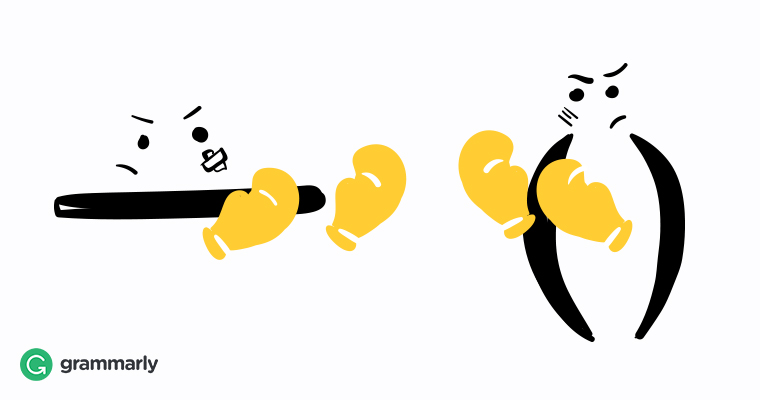Writing that engages—that grabs—on occasion makes use of both parentheses and dashes (or, it should). These two types of punctuation have been duking it out for many years. Proponents of each argue about which is the most understandable to modern readers.
Can parentheses and dashes be used interchangeably? Should writers prefer one to the other? Are dashes suave and parentheticals clunky?
It’s a tough call, so let’s dive in.
Parentheses
Parentheses separate explanatory or qualifying remarks from the rest of a sentence. The information inside the parentheses is typically not necessary to fully understanding the sentence. For example, “The summer solstice (between June 20 and June 22) is the longest day of the year.” Using parentheses to interject the possible dates of the solstice, as they vary from year to year, adds helpful information to the sentence. But those dates are not strictly necessary; the sentence was fine without them.

Do parentheses, then, make sentences unnecessarily wordy? In looking at the AP style guide, we find that the popularity of parentheses is on the wane. As a matter of fact, the AP would prefer that you stop using parentheses entirely. After all, why include an aside in your writing (jarring to the reader) when you can just compose two sentences? Let the parentheses die a quiet death, alone and unused. This is the main for shelving parentheses, at least.
Dashes
Oh, the dash. Unlike parentheses, the dash is quite popular in news writing—in all types of writing, really. The dash comes in two distinct varieties: the em dash and the en dash. The em dash is about as wide as the letter M, while the slightly shorter en dash is about as wide as an N.
The en dash is often used as a replacement for the word “to.” You’ll often see them used for timespans, as in “the years 1950-1970.”
The em dash, on the other hand, marks an abrupt change of thought in a sentence. It has rapidly become the Swiss army knife of punctuation. It can mark pauses for dramatic effect, express contrary emotions, connect dates, denote a quote’s author, replace a colon or semicolon, and even wrap up a series of phrases that need a conclusion.
Dashes are versatile, all right, but they can also disrupt the flow of a sentence. Too many of them can give your reader mental whiplash. That’s what dash detractors usually argue, anyway.
Which type of punctuation do you prefer in your writing? Should we jump on the AP’s bandwagon and learn to love the dash? Or, do parentheses still have a place?
We invite your comments in this debate.
![]()





